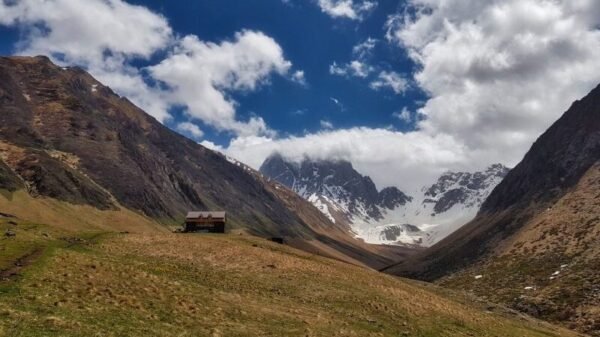Contents
What is Ecotourism and What’s There For You?
What is ecotourism and why is it important to include this type of travel experience in your future travel plans?
Global COVID lockdowns have changed the way we all look at travel. Pandemic pushes us to think more responsibly because it is the only way we can continue living on this planet well.
The future of travel is also likely to change because this is the time when individual travel experiences become more attractive than traditional mass tourism. There is no doubt that it is good for the environment and for each of us.
Ecotourism is a way to travel responsibly and get back to our roots – back to nature.
This article is an easily understandable yet comprehensive guide on what is ecotourism. It has two main purposes:
- To give an in-depth and professional insight for everyone interested in what is ecotourism,
- To help you to make your next trip into a unique, unforgettable, and truly sustainable travel experience.
This article includes everything you need to know to make your future travels green, valuable, and responsible.
You will also find here convenient infographics and even SWOT analysis both of ecotourism advantages and disadvantages. These include the list of benefits and also (naturally) some drawbacks that come with choosing ecotourism instead of traditional mass tourism experiences.
This all is well wrapped in not only a traditional travel blogger’s but also biology and conservation expert’s view point.
It’s quite a long read. Therefore, feel free to skim it or have a look at the table of contents below to get right to the topic you are most interested in. You can also jump to the CONCLUSION part, where I have summarized everything very shortly.

What Makes Me Speak (and Write)?
I am a biologist and professional conservationist for more than 20 years now. Over a quarter of this time, I have spent developing my own ecotourism company, being a travel blogger, and spreading the word of ecotourism benefits to other travelers. Now I would like to share both the worldwide and my own experience on ecotourism with you.
I hope that this article will help to understand ecotourism better and make it more popular.

Ecotourism Definition
First, it is important to understand what is ecotourism. So, what does it actually mean?
According to The International Ecotourism Society, “ecotourism is responsible travel to natural areas that conserves the environment, sustains the well-being of the local people, and involves interpretation and education”.
Therefore, ecotourism definition very much refers to the principle of responsible travel.
Ecotourism is also closely related to other buzzwords like sustainable tourism, nature tourism, green travel, ethical tourism, mindful travel, conscious travel, and others. However, the main difference is that ecotourism is focused on traveling to natural areas.
Ecotourism & Sustainable Travel
Is ecotourism sustainable? Yes, at least it is meant to be.
Ecotourism goes hand in hand with the wider term of sustainable travel.
Sustainable travel is not an ecotourism synonym though. In its essence ecotourism is a sustainable and educational kind of nature travel. However, only responsible ecotourism is sustainable.
You cannot have a responsible ecotourism experience without following sustainable travel principles. These are:
- Do sustainable travel planning,
- Look for under-the-radar places,
- Use fewer resources and do less shopping, buy more local goods,
- Choose direct flights when possible & fly economy class,
- Use public transport as much as possible,
- Do not buy wild animals and plants or their products,
- Choose more local and authentic trips – be a traveler, not a tourist,
- Travel more on “off-season” and “shoulder season”,
- Choose slow travel,
- Leave fair reviews,
- Paying less does not always mean that you are saving,
- Choose responsible eco-tourism services,
- Choose more “soft adventure” trips and avoid “exclusive adventures”,
- Stay in locally owned places,
- Eat local food,
- Watch out and avoid “greenwashing”,
- Try out volunteering,
- Pack light,
- Do not use toxic sunscreens,
- Follow the main sustainable tourism pillars.
Read about all these core principles of sustainable travel here: 20 Ultimate Tips for Sustainable Travel.

Ecotourism Principles
Ecotourism definition comes with several important ecotourism principles. Here they are explained in a simple way one by one:
#1: Minimize impacts
Ecotourism benefits include reducing different kinds of human impacts.
Physical impacts
Like any other activity, traveling has a physical impact. The more people travel to any place, the more physical impact it gets. That simple.
Environment and local societies are normally the ones who suffer form this impact the most.
People leave different physical impacts. Here are the examples:
- Destroying natural vegetation by walking or driving,
- Disturbing wild animals,
- Picking up stones, shells, dead (or even worse alive) corrals, and other natural artifacts,
- Leaving trash,
- Cars, speedboats, and airplanes pollute the air,
- Careless divers often touch and destroy the corals,
- Etc.
These are all physical impacts that ecotourism aims to reduce.
Make your trip responsible and leave the least possible physical impact wherever you go! Do not take anything from nature with you except the trash. Even if it is not your trash you will help greatly by picking it up.
Social impacts
There are also social impacts. Travelers coming from different countries have different cultural backgrounds. Wherever you go, it is important to respect the local social structure and traditions. This should go without saying even if it seems strange for you.
Paying a lot of money for your trip does not mean you get a ticket to push your way of life. You have paid for authentic travel experiences. Therefore, do the utmost to enjoy them. Be open, enjoy the local culture and traditions in a condensed way. This is where ecotourism benefits come into play.
Be aware that social impacts are usually mutual. Namely, the local people get affected by your social standards too. This is especially so if they see a lot of travelers like you.
For instance, the long social psychological research shows that the so-called “social proof” principle acts regardless of the culture. In its essence, the people look at each other to understand what the “correct” social behavior in the given situation is.
Here we come to behavioral impacts.
Behavioral impacts
Whatever you do and the way you behave leaves and impact on others.
If you are rude and arrogant during your trip, then chances are the locals either will become rude to you too or they will just withdraw.
Even worse, the association principle will make at least some of them think that the country and nation that you are coming from are generally rude and arrogant.
Also, people tend to take over behavioral habits from those they see as more successful.
Humans are socially very flexible species. Therefore, it is not uncommon to change our behavior based on what others do.
Ecotourism aims to reduce negative behavioral impacts on local cultures and societies.
When you travel be mindful of your behavior. The good tone is to be kind, humble, and truly open-minded. Listen more than speak. Soak up new experiences and learn from them.
Don’t compare your culture, traditions, social structure with the local ones. Even if you think that you are better at something it is usually a very subjective option and leaves a negative psychological impact on locals.
Psychological impacts
Psychological impacts are related to all the other impacts above. Therefore, whatever you do or say during your trip leaves some traces in the local peoples’ minds.
Ecotourism trips aim to leave only good and positive traces.
There is big social and income inequity in the world both between the countries and within the countries. There is no excuse for making this gap even bigger by expressing a superior attitude.
The comparison leads to lower self-esteem for those who are in a worse economic situation. This in its turn leads to depression, anxiety, and sometimes even violence against tourists.
Ecotourism trips should aim to leave the least possible impact on the local environment and local societies.
Therefore, you should actually strengthen the self-esteem of the local people. Seek for the good things to mention! Make locals feel that the place they live, their culture, and their traditions are something special because they are. They will reward you greatly with the best and most authentic experiences.

#2: Build environmental and cultural awareness and respect
Ecotourism activities play an increasing role in building overall awareness and respect.
Environmental awareness
Undeniably environmental concerns are currently at the top of the global priority list. However, in reality, the “never-ending” economic growth is still more important for most countries, even those that are relatively green.
It is quite clear that the future of our planet depends on our environmental awareness.
Ecotourism activities put a big emphasis on building environmental education because to protect something, you must first know it, right?
By visiting nature you get to know why it is so important for our own survival. Facing real stories of rare and endangered species and habitats will open your eyes because these are not some abstract numbers and charts anymore. During an ecotourism trip, you get to know the diversity of life and its real threats in your full presence.

It is only if you see directly what you are destroying you can stop doing it. This way an ecotourism trip may become a transformational trip. It can make you grow and leave only a positive impact from that moment on.
Therefore, it is so important to make sure you have a true, authentic, and non-harmful ecotourism experience.
Cultural awareness and respect
Similarly, as for the environmental awareness ecotourism builds cultural awareness.
All local communities are historically deeply connected with natural ecosystems. The modern world and urbanization bring people away from nature. Therefore, the traditions are often lost or adjusted to the new urban conditions.
Almost all the cultures and traditions have changed during the time. What we consider authentic now was most probably different one thousand years ago. Most cultures are subject to change because of the impact of other cultures and traditions.
However, it does not mean that we have a right to disrespect other cultures as we see them now.
Ecotourism aims to leave the least impact on the local cultures. Ecotourism trips give you the opportunity to be a curious observer and learner instead of being an intruder.
The mass tourism experiences on the contrary are usually fine-tuned for tourists and have very much lost their “authenticity”.
Ecotourism trips help you learn a lot about other cultures and naturally build respect for something that is different. You achieve this through interaction with local people and their traditions. This way you also see the importance of nature in their lives.

Your “deeper” awareness
Here is another dimension of awareness that I would like to add to the traditional ecotourism principles.
Apart from environmental and cultural awareness, it is even more important to build your own “deeper” awareness.
In fact, it is hard to become environmentally and culturally aware, if we do not work on our own self-awareness. Any kind of awareness becomes impossible if we act out of our egocentric needs only.
Therefore, as far as each of us thinks of ourselves as the center of existence, we will continue endless greedy competition for limited natural resources. This includes every aspect of our lives including traveling.
Unless we will understand that we are all in one boat we will continue destroying nature and other cultures. However, we must understand it experientially, not intellectually. One must start to become more aware of every single activity (and non-activity) he or she does or doesn’t do.
We can save the planet only by starting with ourselves. Therefore, we must become more conscious. This is the only way and it includes our travel choices too.
Practice mindfulness in whatever you do and don’t do.
The biggest threat to the environment, other people, and ultimately for you yourself is your own unconscious actions and non-actions.
Ecotourism connects you with nature. Nature calms down, helps you to become more mindful, less egocentric, and more compassionate.
Therefore, ecotourism benefits are not limited only to environmental awareness and cultural respect. Ecotourism helps you to connect with yourself and others.
Spiritual travel
Spiritual travel is another kind of travel experience that becomes increasingly popular. It is a great way to take part in and learn more about local culture and traditions.
We all want to make our lives better. Therefore, we are looking for deeper meaning in their lives. Naturally, many of us want to get some added value from our trips too, so that it is not just having fun.
How can we lean expand our consciousness and become more aware? How can learn to live with ease and according to nature?
The answers to these questions are often hard to find in our everyday modern life just because it has too much stress, distractions, and competition. We are much more likely to find them in connection with nature, authentic traditions, and simplicity. Very often spiritual travel includes all these elements, and, therefore, is so attractive.

#3: Positive experiences for visitors and hosts
Good ecotourism examples provide great experiences both for travelers and for the hosts.
Ecotourism companies usually aim to provide original travel experiences for small groups or for individual travelers.
As the BBC states it ecotourism is designed to be low impact and small scale. It aims at visiting unspoiled and fragile areas that are usually protected. Tourist facilities are made to blend in with the natural environment, food is sourced locally, and waste is usually managed on-site.
Obviously, ecotourism trips have typically a more personal approach and leave fewer negative impacts (see #1 above).
On ecotourism trips, travelers are more likely to meet like-minded travel fellows. While hosts usually receive environmentally more conscious and respectful travelers and a great experience with like-minded guests. Therefore, it works so well.
Smaller like-minded groups come along with the increased cost of ecotourism trips for visitors. However, it is worth remembering that your money supports the local communities, and hosts are also motivated to provide more authentic services.
#4: Financial benefits for conservation
The ecotourism trips are usually organized to the protected nature areas.
Conservation and maintenance of these areas are costly. The conservation activities are usually funded by the state, municipalities, or from different local, regional, and international funds (NGOs).
Unfortunately, nature conservation is hardly a priority anywhere unless the county is very much focused on ecotourism (like for example Costa Rica). Therefore, the protected areas usually struggle with insufficient funding all around the world.
Here is where you can help by choosing ecotourism trips that are often organized either by the administration of the parks or the local ecotourism companies or both.
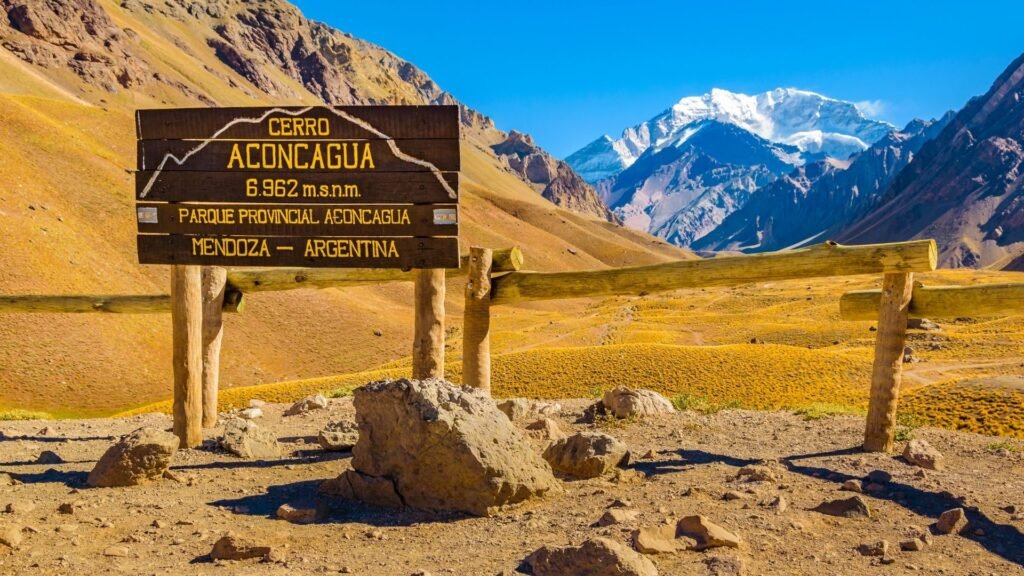
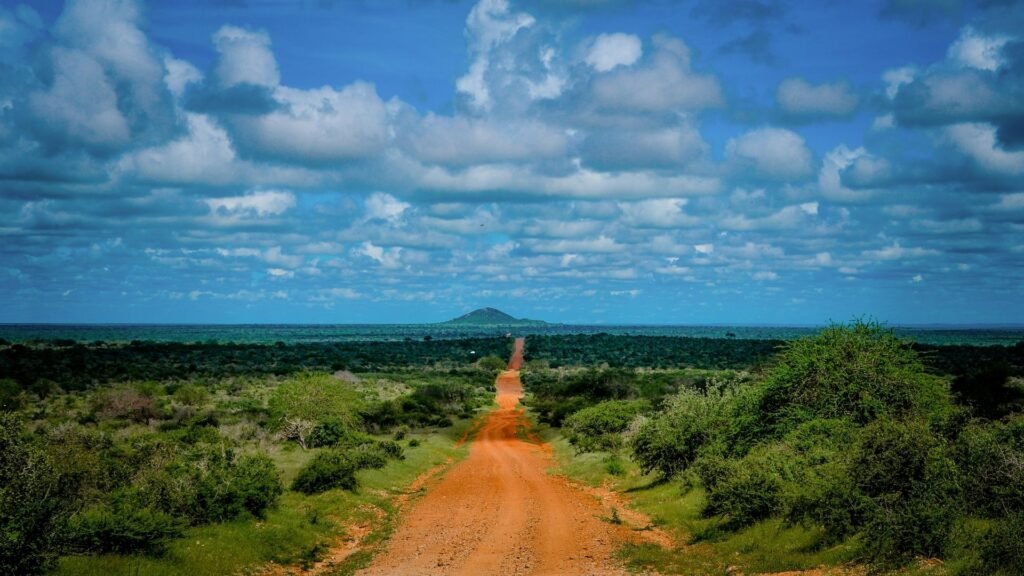
Sometimes ecotourism companies take an active part in conservation activities. For instance, you can join a volunteering program of your choice. This way you will provide a direct financial benefit for conservation during your ecotourism trip.
#5: Financial benefits for locals
Ecotourism activities bring direct financial benefits the to local people and local ecotourism companies.
Mass tourism, on the contrary, is often tied with large international hotel chains, car rental companies, and other large travel service providers. Therefore, it is quite common that only a very small share of their income (if any) returns to the local communities.
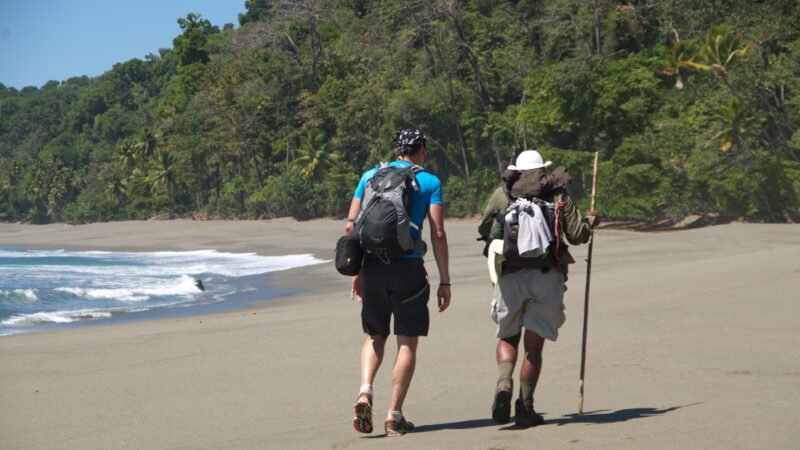
#6: Increase understanding about a travel destination
Ecotourism activities are usually much more authentic than the traditional mass tourism experiences.
You will meet more “real” local people, eat real local food, have real local conversations on your ecotourism trip. This way you will have a much more authentic travel experience.
#7: Ecotourism helps to set up low-impact facilities
The main concept of ecotourism is sustainability. Therefore, the development of low-impact tourist facilities is another ecotourism benefit.
Ecotourism companies and hosts tend to use more solar, wind, or water energy for their facilities. The waste is often managed locally as much as it is possible, and a “zero waste” concept becomes increasingly popular.
Guesthouses are often built using renewable local materials like wood, reeds, clay, etc.
More advanced ecotourism places build so-called passive houses. Such houses save energy by using solar power for heating and natural materials (like dry grass) for insulation of walls. Electricity comes from the sun, wind, and/or water. Roofs are made to cast a shadow on the windows. This naturally cools down rooms without the help of air conditioners. Such energy-saving houses use smart technologies to keep the temperature indoors constant and energy consumption to the minimum.
Low-impact facilities fit well in the natural environment and leaves the lest possible impact.
#8: Protect the rights and spiritual beliefs of the indigenous people
Ecotourism activities are focused on reconnecting with the nature and experiencing the local traditions.
Therefore, ecotourism principles refer to the rights and spiritual believes of the local indigenous people. This also goes hand in hand with reducing physical, social, behavioral, and psychological impacts (see #1 above).
It is important that travelers and ecotourism companies respect the local traditions and nourishes them. This is how we all can help to preserve nature, keep the traditions alive, and be sustainable in a long term.
What are the Ecotourism Benefits?
Let’s summarize ecotourism benefits here.
The core ecotourism benefits for travelers are observing and learning about wildlife and local traditions. Therefore, ecotourism provides unique travel experiences.
Ecotourism places are mostly the areas least changed and affected by humans. These are national parks, nature reserves, nature parks, biosphere reserves, and other similar establishments.
Nevertheless, ecotourism benefits are not limited to travelers only. It is not just about getting new escape travel experiences.
Ecotourism encourages leaving a positive impact, helping the local communities, and solving environmental problems. Ecotourism benefits focus on long-term sustainability rather than short-term profits. Therefore, it is in its essence responsible travel.
It also helps educating the travelers, so you become aware of the importance of:
- Conservation of biodiversity,
- The lifestyle, traditions, and specific needs of the local people,
- Environmental issues.
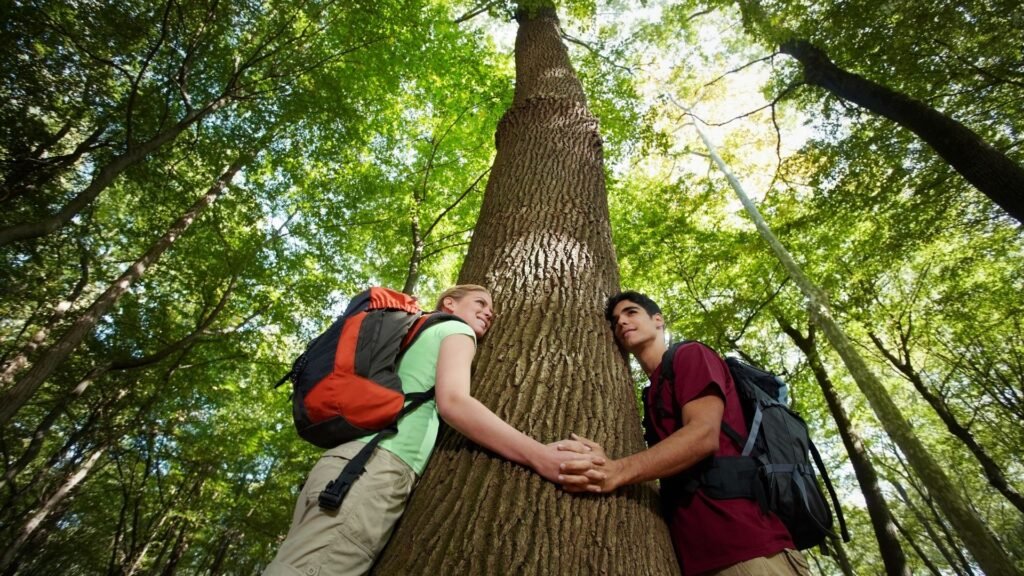
Ecotourism Pros and Cons
Like with everything in life, ecotourism has its pros and cons. Here are its advantages and disadvantages compared to traditional mass tourism trips.
These are twelve ecotourism advantages compared to mass tourism disadvantages.
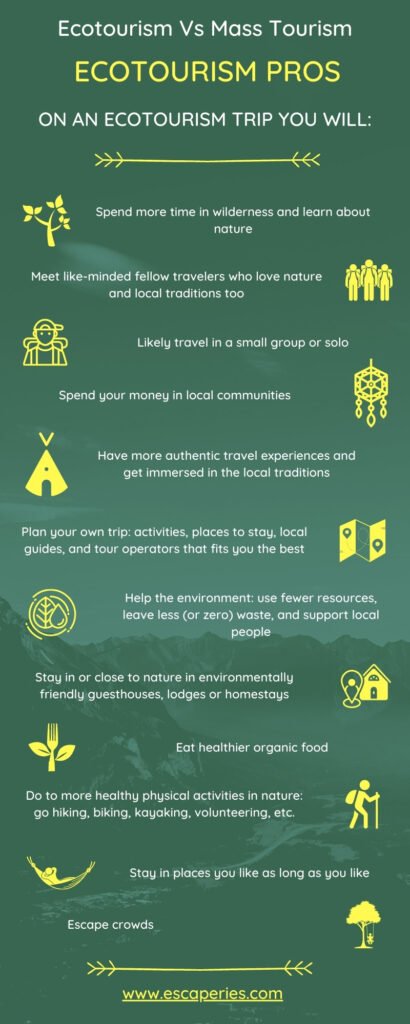
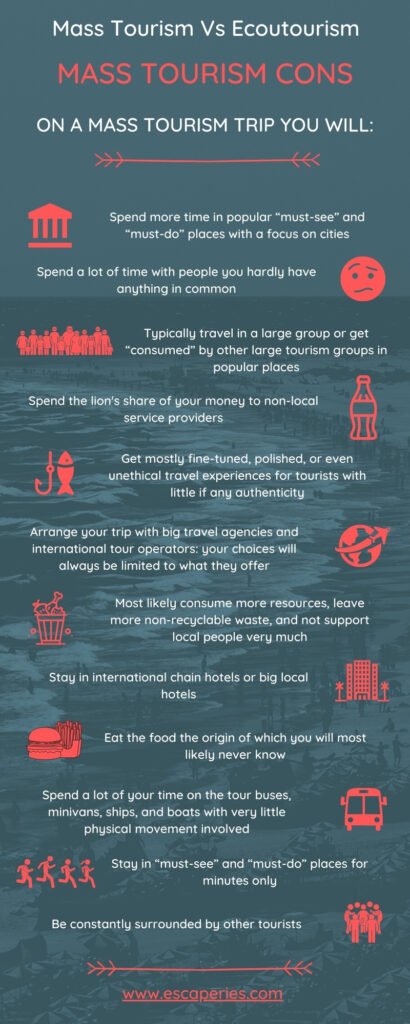
Here are the six ecotourism disadvantages compared to mass tourism advantages.
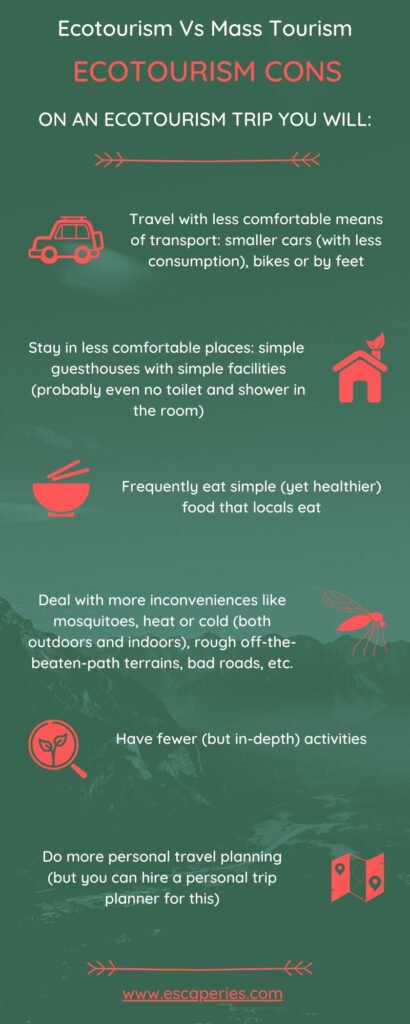

Ecotourism Examples
USA Today highlights three main types of ecotourism. They go hand in hand with the ecotourism principles described above. Let’s summarize them here along with some of my own ecotourism examples.
#1: Endangered wildlife ecotourism
The main focus of any ecotourism trip is raising awareness about wildlife, protected nature areas, and endangered species.
Ecotourism companies often collaborate with conservation agencies to bring the local communities and conservation needs together.
Ecotourism trips may focus on one species or one type of species only in their natural environment like spotting gorillas in Rwanda or birdwatching in Ecuador.
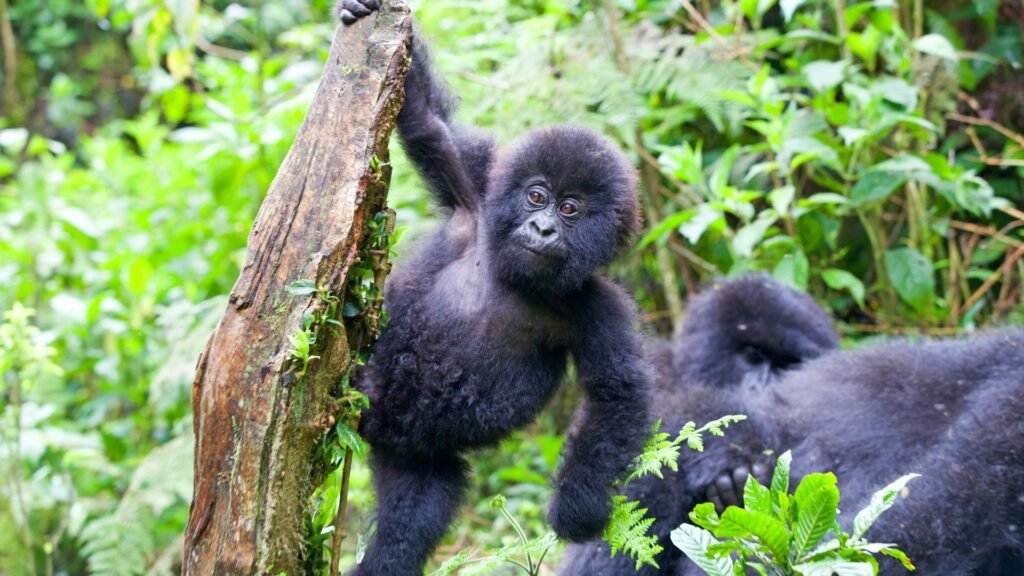

However, more often it is discovering the whole stunning pristine ecosystems like ancient Taman Negara Rainforest in Malaysia, Monteverde cloud forest in Costa Rica, Raja Ampat underwater world in Indonesia, Raised Bogs in Latvia, or Galapagos Islands in Ecuador.


A great example of a wild hiking ecotourism trip that I have been to is in the remote Osa Peninsula in Costa Rica. This was an exclusive chance to visit what National Geographic calls one of the most biodiverse spots on Earth. A two-day hike included everything that a nature lover like me could wish for.
We walked through pristine jungle, explored serene Pacific coastline with black volcanic sand, crossed several small rivers, and spotted many endangered and rare species. These included wild tapirs, American crocodiles, colorful poison dart frogs, plenty of birds, toads of the size of the Guiney Pig and playful Spider monkeys. Chilling howls of Howler monkeys in the middle of the night and a sun-basking American crocodile some 100 meters from where we were swimming made this ecotourism adventure even more memorable.
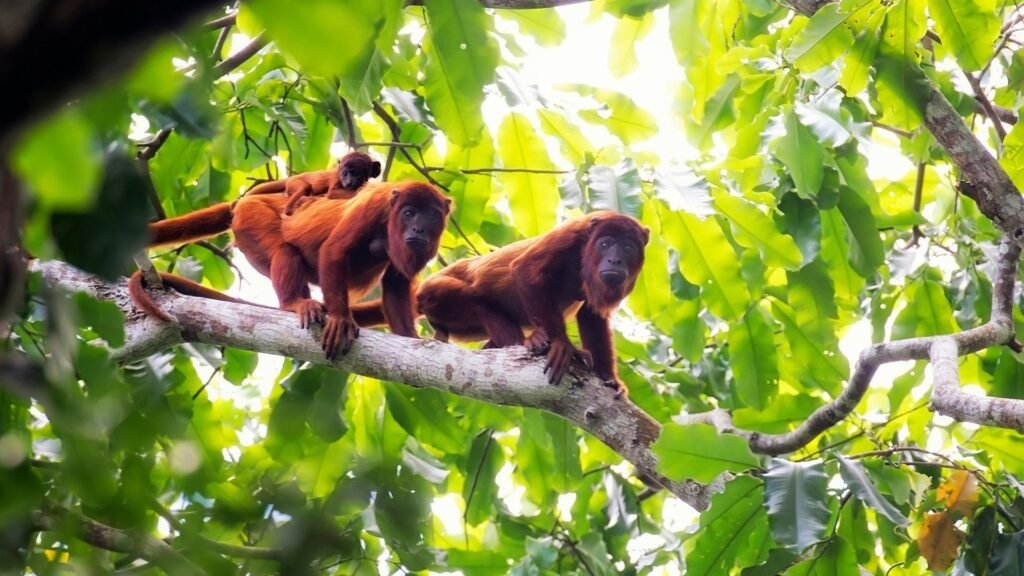
#2: Cultural ecotourism
Cultural ecotourism aims to explore cultural diversity while remaining a responsible traveler. This kind of trip may aim to protect sacred sites, explore spiritual customs, or help preserve traditions.
You should choose an ecotourism company that employs local guides and ensures that the experience is positive for the traveler and the local communities. During such trips, you will also help local communities by spending your money on local goods like handicrafts and having your meals in local restaurants.
I have had several great cultural ecotourism trips. One of such was back in 2007 in the Orinoko river delta in Venezuela. You can meet native American tribes in the Orinoco jungle still living very much an authentic jungle lifestyle. Their daily routines include fishing, hunting, making, and selling some real handicrafts to rare travelers that arrive there.

Another great example was in Peruvian Andes not far from the popular Cusco town. Some local native tribes still live a very authentic and basic life there in the mountains. Tourism lets them earn some extra cash by selling famous alpaca wool sweaters, jumpers, and hats, colorful scarfs, and many other handicrafts. However, unlike in many other places, a visit to their village did not leave an impression of a fake attraction made just for tourists.
#3: Adventure ecotourism
One of the ecotourism advantages is that you can often combine your wildlife and local cultural trip with some kind of exciting and adventurous activity.
Hiking is by far the most available and most eco-friendly activity. You can go hiking almost everywhere. The stunning Peruvian Andes, secluded Baltic Seacoast in Latvia, and Corcovado National Park in Osa Penisula (Costa-Rica) will quite different yet all stunning ecotourism trips.


Alternatively, you can also go to an awesome kayaking or canoeing trip that does not require any huge kayaking skills in very distinct places on the planet. Freshwater kayaking in Khao Sok National Park or sea kayaking in Phang Nga Bay in Thailand will be very much different from what you will see let’s say in Canada or Latvia. Therefore, all these options are usually awesome.
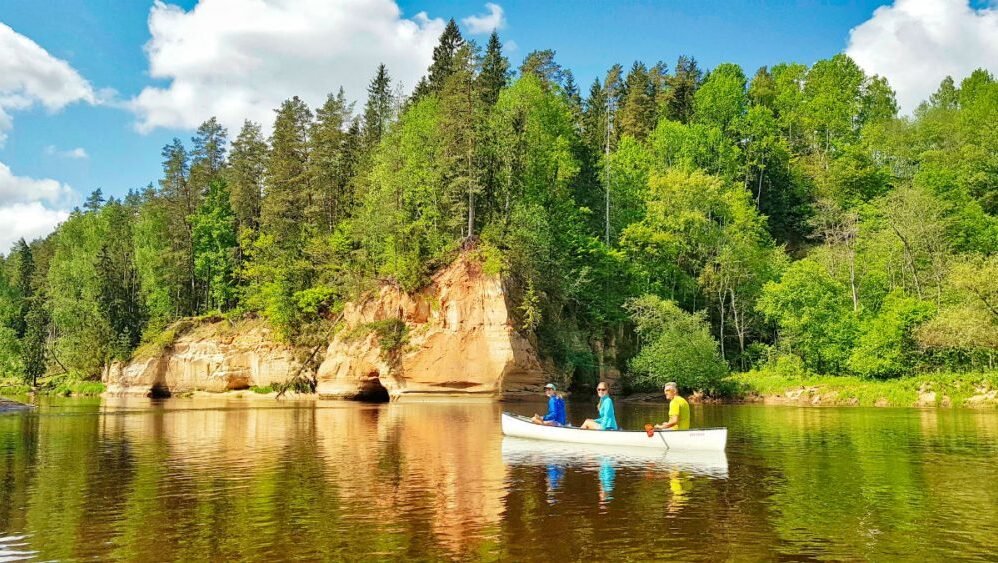
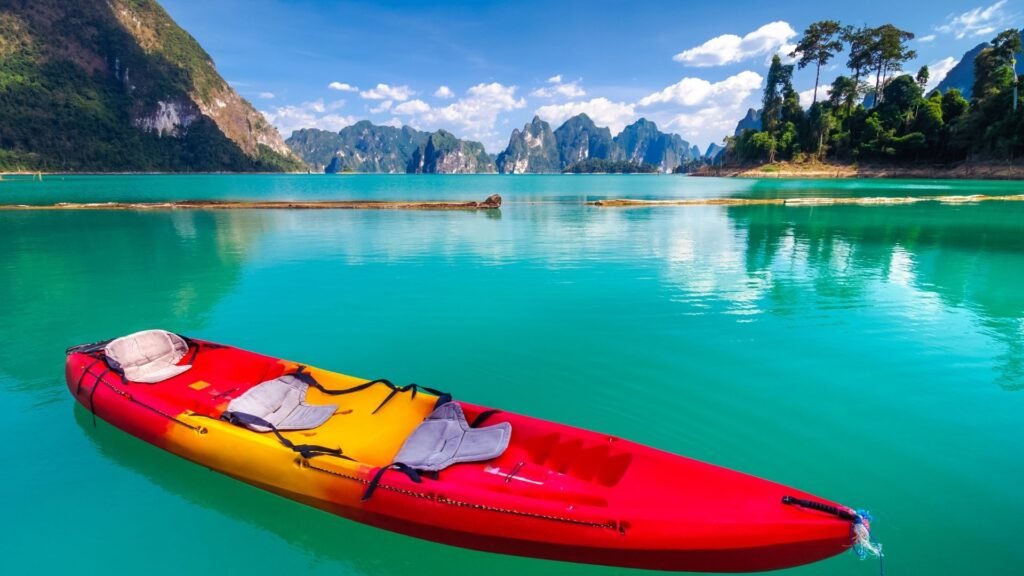
By choosing carefully and reading reviews you can also find eco-friendly scuba diving adventures in the famous Great Barrier Reef of Australia, Indonesia, Fiji, Belize, or the Red Sea in Egypt. Choose shore diving instead of boat diving, if you can, and you will save both environment and money.
There are other soft adventure ecotourism trips that are eco-friendly. For example, doing some guided Zip-line canopy tours in Costa Rica or Malaysia or going to a birds’ photography expedition in Ecuador is something to remember.
Be sure to avoid exclusive travel adventures. Adventure travel that includes transportation by helicopters, private jets, yachts, ships, jeeps, etc. is not sustainable. This kind of travel has a huge CO2 footprint and mostly goes against ecotourism principles.
Ecotourism Destinations
Travelers become more environmentally responsible and are looking for new authentic experiences. This is why the interest in ecotourism destinations grows.
There are what we can call “classic” ecotourism destinations and the ones that had just recently emerged and therefore even more attractive for the seekers of authentic escape travel experiences.
I am coming up with a detailed post on the best ecotourism destinations. So, for now, here is a list of countries that are some of the most attractive ecotourism examples.
Classic ecotourism destinations
Well-known or “classic” ecotourism destinations are Costa Rica (or the ecotourism paradise), Chile, Belize, Ecuador, Switzerland, Norway, Iceland, Tanzania, Malaysia, Morocco, Australia, Thailand, Canada, Hawaii, and others.
There is a good reason why all these places are so popular. Therefore, some of them have become rather crowded and expensive. Unfortunately, some of these destinations face a serious risk of over-tourism. Therefore, governments should probably think more about how to manage tourist flows so that conservation of natural cultural values stays a priority. I am sure the new technologies can be of great help here.
Emerging ecotourism destinations
More traveling means a higher demand for new travel destinations and new experiences.
It’s already been a while since new or relatively new ecotourism destinations are becoming increasingly popular. Such is Bhutan, Indonesia, Nepal in Asia, Latvia, Georgia (Sakartvelo), Estonia, Slovenia, Portugal and Croatia in Europe, Kenia, Rwanda, South Africa, Namibia in Africa, New Zeeland, Fiji and Philippines in the Pacific, Panama, Nicaragua, Bolivia, Peru, and Colombia in Latin America.
There are more. I believe that almost every country has something to offer as an ecotourism experience. It is just a matter of priorities for now.

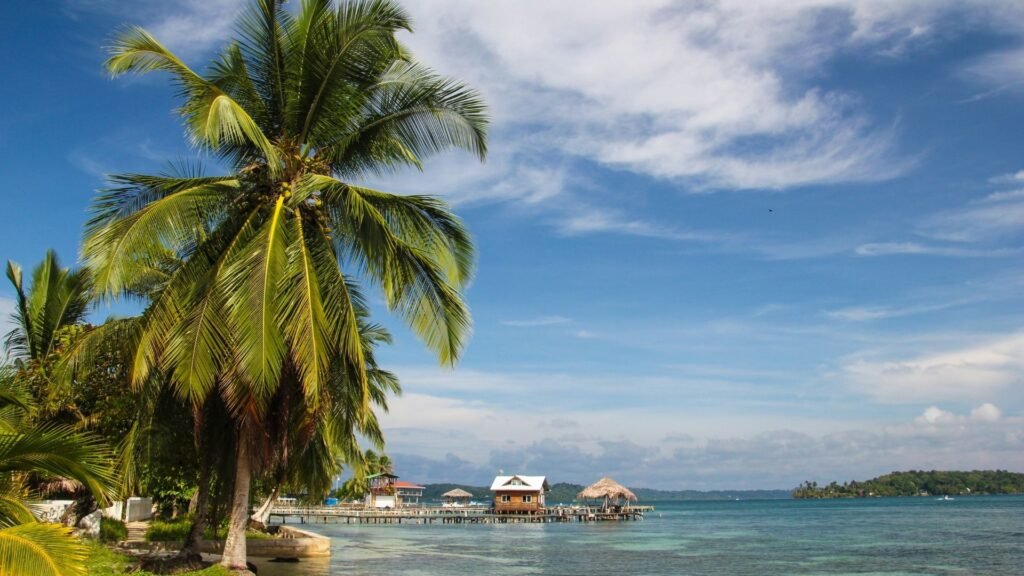
Negative Impacts of Ecotourism
As it becomes more popular ecotourism has its negative sides too. It is uncommon for tourism professionals to speak about too much because after all, it is still a business.
I believe though that ecotourism negative impacts is something to speak out loud. This is the only way to make things better and avoid similar mistakes in the future.
Do not disturb wildlife
Disturbing wild animals is one of the ecotourism negative impacts. Ecotourism is about exploring and observing wildlife and cultural heritage. Therefore, responsible travel principles are especially important here.
You should ALWAYS choose tours and guides that do not disturb wildlife. A good sign of responsible experience is not getting in direct contact and interacting with wild animals. Therefore, if somebody offers you an “exclusive option” to feed or touch the wild animals, go elsewhere.
A responsible ecotourism trip means observing wildlife in its natural environment and staying as invisible and silent a possible. Remember, you are just a guest.
There might be some exceptions when you get close enough to the animals like, for example, in Borneo’s Orangutan sanctuaries or you just happen to get in their way. However, you should never be allowed to pet wild animals.

Threat local communities with respect
Local communities may gain and also suffer from tourism.
By chasing the profit tour companies often neglect the needs of locals and sometimes tend to show some “superiority” over them. So, the local guides are often treated badly.
The cheap tour price also often comes with its dark sides, because it is not uncommon that the local staff is heavily underpaid and faces an unfair attitude.
Be alert, watch for this kind of attitude, and avoid such travel services. There are always better options out there.
Some contacts with local communities are clearly arranged just for tourists and seem to exploit local people more than does good for them. I witnessed such an unfortunate example with a long-neck Karen tribe village in Northern Thailand. You can read more about this experience HERE.

Remember to avoid leaving any physical, social, behavioral, and psychological impacts during your ecotourism trip (see more details in #1 above).
Don’t support any attractions with wild animals
Well, first of all, any attraction where you are supposed to actively interact with wild animals is not an ecotourism trip. Nevertheless, some unfair travel service providers can make you think it is.
Never go to the places offering close-up pictures with “calm” predators like tigers, lions, and bears, because they drug these animals and usually keep them in terrible conditions.
You might have heard that you must refrain from riding elephants. You really must. The prominent animal protection page Dodo reveals the harsh truth on this seemingly fun activity. Elephants “employed” in the tourism industry receive great physical and mental trauma. Isolation, starving, hitting, and beating is a common practice to break their spirits and get them to behave and do a show for you.
The cruelty does not stop only with big animals. Monkeys, birds, and reptiles suffer equally badly. Don’t pay a cent for taking pictures with wild animals kept in captivity.
Even so-called eco-friendly animal sanctuaries that receive tourists leave a bitter aftertaste sometimes. I’ve had not that great experience visiting an elephant sanctuary near Chiang Mai in Thailand. Read about it HERE.
Scuba diving (and snorkeling) is loosing its charm
Unfortunately scuba diving and snorkeling is an ecotourism example that has considerable negative impact these days.
The famous French naval officer, explorer, and conservationist Jacques Yves Cousteau’s first tried his scuba diving prototype in 1943. Since then it has gone viral. Scuba diving opens a whole new and wonderful underwater world for the masses, but there is a price for that.
Diving is a great way to learn a lot about marine wildlife and conservation. Unfortunately, many popular diving destinations have become too popular and crowded.
In theory, all divers learn not to touch or take anything while being underwater. However, the reality is very often far from that, especially in most popular places. I have seen coral reefs that suffer greatly from the abundance of diving visits. This is especially true for inexperienced divers who often damage corals accidentally or intentionally.
The places like Dahab in Egypt offers great shore diving options. This makes diving more affordable and in a sense even more environmentally friendly because you don’t have to go by boat anywhere. However, this also means that all divers enter the shallow water through coral reefs. Needless to say, these reefs are not that healthy anymore.


Choose carefully before you go on your next diving trip. It may leave a considerable CO2 footprint if you go by boat and also a direct physical impact on fragile underwater ecosystems. Consider if you really need to go to your diving trip to a popular dive site at all, especially during the high season.
Watch out for “Greenwashing”
“Greenwashing” describes the practice when a company appears to be more environmentally friendly than it really is. USA Today calls this “practice” a marketing scheme involving the creation of a false image of environmental concern and responsibility.
Here is how you can avoid “greenwashing”.
Check out for green certifications
The best way to keep track of ecotourism companies is to check out their certifications. Check out if your destination country has any certification for sustainable travel products and services. You can also ask your travel planner to do it for you.
However, you should also remember that ecotourism companies may be eco-friendly without being certified. Many countries lack any certifications and the smallest service providers sometimes can not afford any certification.
Read and leave reviews
Certification of the company is a good sign that you can expect sustainable travel products and services. Yet, you should not automatically exclude other ecotourism companies from your sustainable travel list.
Before certification gets global and even if there is a local certification in place, I suggest checking out travel reviews on Google, TripAdvisor, Booking.com, GetYourGuide, etc. User-generated (and therefore very reliable) reviews have a great potential in helping to eliminate “greenwashing” practices.
Also, reading the travel blogs helps to get the idea if an ecotourism company is sustainable.
Follow sustainable travel principles
A great way to reduce the negative impacts of ecotourism is to follow sustainable travel principles. Read about them HERE.
Ecotourism SWOT Analysis
You have probably noticed that many ecotourism pros and cons are relative. It all depends on what you actually expect from your trip. The same is for mass tourism.
Some of the ecotourism cons can be actually seen as its advantages for those looking for authentic escape travel experiences. While some of the ecotourism advantages might not be that appealing compared to mass tourism comforts (see the four Infograms above).
Let’s look at ecotourism pros and cons by comparing its strengths, weaknesses, opportunities, and threats in one easy to understand overview chart (SWAT analysis) here.
Ecotourism advantages are its strengths and opportunities. Ecotourism disadvantages are its threats and weaknesses.
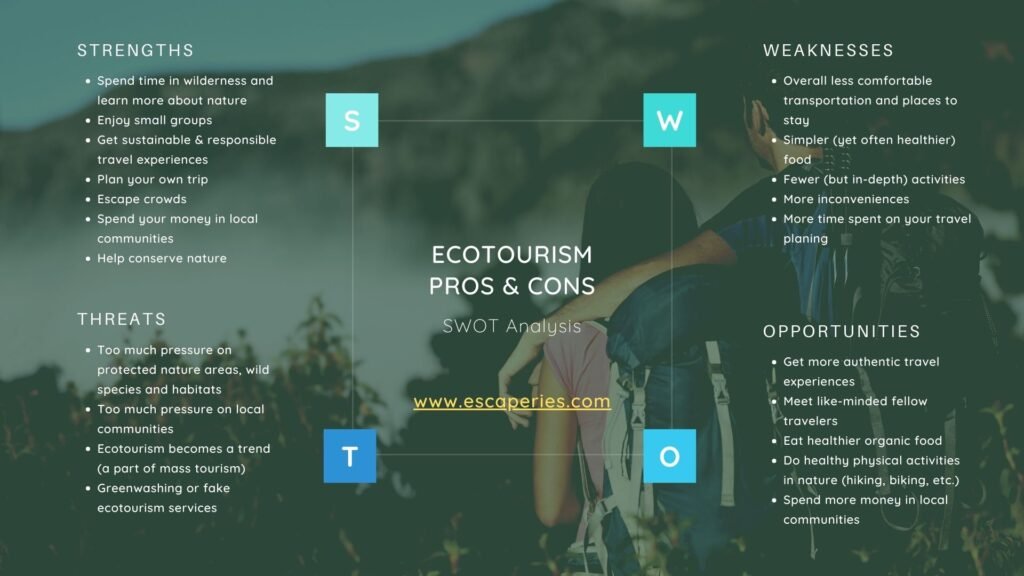
What are the Ecotourism Trends?
Sustainable travel and ecotourism are slowly getting more popular.
According to Forbes, the so-called last-chance tourism was the top travel trend for 2018. Forbes also notes that last-chance travel is leading to a rising interest in ecotourism and sustainable hotel experiences.
So far ecotourism has not been the most popular way to travel and it is still far from reaching its real potential. It has been seen more like an exclusive travel experience with an added value for the people who like nature and local traditions.
However, ecotourism trends show that everything changes.
The worldwide lockdowns caused by the COVID-19 pandemic and extended periods of social isolation pushes people to think more about authentic values.
While we cannot go to crowded shopping malls anymore in most of the countries we can still go out in nature. We do more local hikes, biking, and kayaking trips. This new lifestyle hopefully makes a great basis for new good travel habits. We are slowly reconnecting with nature. Therefore, there is a hope that travelers will choose more ecotourism activities in the future.
Sooner or later we will be back to worldwide traveling again, and there is a good chance that people will look for more authentic escape travel experiences. Exciting ecotourism trips are for sure a great and sustainable travel alternative.
Ecotourism is something that can help us to turn away from environmentally harmful mass tourism madness and choose more authentic and green travel experiences.
Conclusion
Ecotourism is responsible travel to natural areas. It aims to conserve the environment, sustain the well-being of the local people, and involves interpretation and education. It also goes hand in hand with all the sustainable travel principles.
Principles
There are generally eight ecotourism principles to follow:
- Avoid leaving any physical, social, behavioral, and psychological impacts,
- Raise environmental and cultural awareness and respect,
- Leave positive experiences for visitors and hosts,
- Provide direct financial benefits for nature conservation,
- Spend your money locally and support local communities,
- Increase your understanding of your travel destination,
- Help setting up low-impact facilities,
- Protect the rights and spiritual beliefs of the indigenous people.
These are also ecotourism benefits.
Pros and cons
Ecotourism has its pros and cons compared to a traditional mass tourism experiences.
Ecotourism advantages are also its strengths and opportunities:
- Spend time in the wilderness and learn more about nature,
- Enjoy small groups,
- Get sustainable & responsible travel experiences,
- Plan your own trip,
- Escape crowds,
- Spend your money in local communities,
- Help conserve nature,
- Get more authentic travel experiences,
- Meet like-minded fellow travelers,
- Eat healthier organic food,
- Do healthy physical activities in nature (hiking, biking, etc.).
Ecotourism disadvantages are also its threats and weaknesses:
- Too much pressure on protected nature areas, wild species, and habitats,
- Too much pressure on local communities,
- Ecotourism becomes a trend (a part of mass tourism),
- Greenwashing or fake ecotourism services,
- Overall less comfortable transportation and places to stay,
- Simpler (yet often healthier) food,
- Fewer (but in-depth) activities,
- More inconveniences,
- More time spent on your travel planning.
Ecotourism examples and destinations
There are three main ecotourism examples or types of ecotourism:
- Endangered wildlife ecotourism,
- Cultural ecotourism,
- Adventure ecotourism.
Very often ecotourism trips include a combination of two or all three of these types of ecotourism.
“Classic” or traditional ecotourism destinations are Costa Rica, Chile, Belize, Ecuador, Switzerland, Norway, Iceland, Tanzania, Malaysia, Morocco, Indonesia, Australia, Thailand, Canada, Hawaii, and others.
New or relatively new ecotourism destinations are such countries as Bhutan in Asia, Latvia, Georgia (Sakartvelo), Estonia, Slovenia and Croatia in Europe, Kenia, Rwanda, South Africa, Namibia in Africa, New Zeeland, Fiji and Philippines in the Pacific, Panama, Nicaragua, Bolivia, Peru, and Colombia in Latin America.
Ecotourism negative impacts
Ecotourism has its negative impacts. Such are:
- Disturbing wildlife,
- Prioritizing profit over conservation of natural and cultural values,
- Treating locals with disrespect,
- Unethical tourist attractions with wild animals,
- Damage caused to coral reef habitats by divers and snorkelers,
- Greenwashing, when companies appear to be more environmentally friendly than they are.
The worldwide lockdowns caused by the COVID-19 pandemic and social isolation pushes people to think more about authentic values and spending more time in nature. This “new normal” may very likely lead to new good travel habits and there is a hope people will choose green travel more.
What is your experience with ecotourism? Tell me about your best or probably the worst experience. Do you see a future for ecotourism? Feel free to drop a comment below and write to me directly at rolands@escaperies.com.

